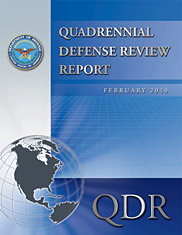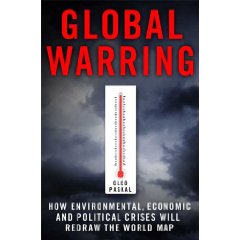
The U.S. Department of Defense (DoD) has issued the 2010 Quadrennial Defense Review to Congress and for the first time specifically addresses climate change as a national security issue. The report identifies potential areas of both near- and long-term concern stating:
Assessments conducted by the intelligence community indicate that climate change could have significant geopolitical impacts around the world, contributing to poverty, environmental degradation, and the further weakening of fragile governments. Climate change will contribute to food and water scarcity, will increase the spread of disease, and may spur or exacerbate mass migration.

Despite the media attention devoted to climate "skeptics" and the recent scandals regarding "climategate" and the exaggerated conclusions of the IPCC regarding the rapidity of Himalayan glacier melt, the DoD policy is unequivocally based on the conclusive evidence of a warming planet and the global consequences which follow. The world wide scientific consensus is conclusive;
The U.S. Global Change Research Program, composed of 13 federal agencies, reported in 2009 that climate-related changes are already being observed in every region of the world including the United States and its coastal waters. Among these physical changes are increases in heavy downpours, rising temperature and sea level, rapidly retreating glaciers, thawing permafrost, lengthening growing seasons, lengthening ice-free seasons in the oceans and on lakes and rivers, earlier snowmelt, and alterations in river flows.
The National Intelligence Council determined that 30 DoD coastal facilities are facing increased risks due to rising sea levels. Energy supplies are of critical importance to national security on both strategic and operational levels and are threatened by a changing global climate system and political instability. A significant portion of the report addresses energy issues, stating:
Energy security for the Department means having assured access to reliable supplies of energy and the ability to protect and deliver sufficient energy to meet operational needs. Energy efficiency can serve as a force multiplier, because it increases the range and endurance of forces in the field and can reduce the number of combat forces diverted to protect energy supply lines, which are vulnerable to both asymmetric and conventional attacks and disruptions. DoD must incorporate geostrategic and operational energy considerations into force planning, requirements development, and acquisition processes. To address these challenges, DoD will fully implement the statutory requirement for the energy efficiency Key Performance Parameter and fully burdened cost of fuel set forth in the 2009 National Defense Authorization Act. The Department will also investigate alternative concepts for improving operational energy use, including the creation of an innovation fund administered by the new Director of Operational Energy to enable components to compete for funding on projects that advance integrated energy solutions.
The Department is increasing its use of renewable energy supplies and reducing energy demand to improve operational effectiveness, reduce greenhouse gas emissions in support of U.S. Climate change initiatives, and protect the Department from energy price fluctuations. The Military Departments have invested in non carbon power sources such as solar, wind, geothermal, and biomass energy at domestic installations and in vehicles powered by alternative fuels, including hybrid power, electricity, hydrogen, and compressed national gas. Solving military challenges through such innovations as more efficient generators, better batteries, lighter materials, and tactically deployed energy sources, has the potential to yield spin-off technologies that benefit the civilian community as well. DoD will partner with academia, other U.S. agencies, and international partners to research, develop, test, and evaluate new sustainable energy technologies.
The Review also targets the rapid melting in the Arctic and "strongly supports accession to the United Nations Convention on the Law of the Sea." This is not an insignificant issue and was explored recently in Copenhagen at the Climate Change and the Military briefing chaired by Tom Spencer, Vice Chairman, Institute for Environmental Security and Project Coordinator, Climate Change & the Military. The speakers included: Brigadier General (ret) Wendell Chris King, Dean of Academics, U.S. Army Command and General Staff College; Major General (ret) Muniruzzaman Khan, President, Bangladesh Institute for Peace and Security Studies; Alexandros Papaioannou, Policy Adviser, Policy Planning Unit, NATO; Nick Mabey, CEO and Founding Director, E3G; and Cleo Paskal, Associate Fellow, Chatham House. As Cleo Pascal explained:
In the same way our physical infrastructure isn't taking into account environmental change, our legal infrastructure is not designed to take into account environmental change. A lot of our laws, treaties and agreements assume the environment is a constant, but it is becoming a variable. So, for example, the UN convention on the law of the sea says that you get a 200-mile exclusive economic zone off of your coastline. The assumption is that the coastline won't change. But if the coastline floods and retreats, for example with the Everglades -- the Everglades are already swamped and the Keys are already sandbars -- not a lot of sea level rise will flood them and your coastline for Florida would potentially move inland. That means your exclusive economic zone if you are using an equidistant border would also retreat along with it legally. Obviously that is not going to happen -- obviously politically we are not going to cede the entrance to the Gulf of Mexico to Cuba. But it shows that when the law fails you end up in a very political area and we are entering times of such conflict already we do not need artificially created security vulnerabilities. Our laws are creating completely unnecessary new problems because they don't incorporate environmental change.

The DOD Quadrennial Defense Review is a landmark document where the US Department of Defense for the first time brings climate change into formal policy and incorporates these considerations into all future national defense planning:
As climate science advances, the Department will regularly reevaluate climate change risks and opportunities in order to develop policies and plans to manage its effects on the Department's operating environment, missions, and facilities. Managing the national security effects of climate change will require DoD to work collaboratively, through a whole-of-government approach, with both traditional allies and new partners.
